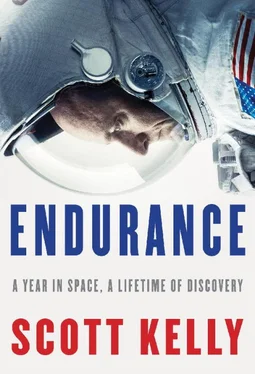Our families in Baikonur are waiting to have a conference call with us, which we’ll do from the Russian service module. I float down there and make a wrong turn. It’s weird to be back here—floating through the station is so familiar, but it’s also disorienting. It’s only day one.
As the smell of space dissipates, I’m starting to detect the unique smell of the ISS, as familiar as the smell of my childhood home. The smell is mostly the off-gassing from the equipment and everything else, which on Earth we call the new car smell. Up here the smell is stronger because the plastic particles are weightless, as is the air, so they mingle in every breath. There is also the faint scent of garbage and a whiff of body odor. Even though we seal up the trash as well as we can, we only get rid of it every few months when a resupply craft reaches us and becomes a garbage truck after we empty it of cargo.
The sound of fans and the hum of electronics are both loud and inescapable. I feel like I have to raise my voice to be heard above the noise, though I know from experience I’ll get used to it. This part of the Russian segment is especially loud. It’s dark and a bit cold as well. I feel a shiver of realization: I’m going to be up here for nearly a year. What exactly have I gotten myself into? It occurs to me for a moment that this might be one of the stupider things I’ve ever done.
When we reach the service module, I notice right away that it’s much brighter than when I was here last. Apparently the Russians have improved their lightbulbs. It’s also much better organized than I remember, which I suspect is a result of Anton trying to impress Gennady with his organizational skills. Gennady is a stickler for keeping the Russian segment neat and tidy.
During the conference call, our families can see and hear us, but we can only hear them. There is a loud echo. The comm configuration up here is slightly off. I hear Charlotte telling me what the launch was like, then I talk briefly to my daughter Samantha and then to Amiko. It’s great to hear their voices. But I’m conscious that my Russian colleagues are waiting to talk to their families, too.
Once we finish the call, I head down to the U.S. segment with Terry and Samantha Cristoforetti, where I’m going to spend the better part of the year to come. Though ISS is all one facility, for the most part the Russians live and work on their side and everyone else lives and works on the other side—“the U.S. segment.” I notice it’s much darker than I remember—burned-out lightbulbs haven’t been replaced. This isn’t Terry and Samantha’s fault, but a reflection of the conservative way the control center has come to manage our consumables since I was last here. I decide to make it a project over the coming months to improve how we use our resources, since I’m going to be up here for so long, and good lighting will be critical to my well-being.
Terry and Samantha show me around, reminding me how things work up here now. They start with the most important piece of equipment to master: the toilet, also known as the Waste and Hygiene Compartment, or WHC. We also run through a quick safety brief that we will redo more thoroughly in a couple of days once I’m more settled. An emergency could strike at any time—fire, ammonia leak, depressurization—and I’ll have to be ready to deal with whatever comes, even on day one.
We head back to the Russian segment for a traditional welcoming party—special dinners are held there every Friday night and on other special occasions, including holidays, birthdays, and good-bye dinners before each Soyuz leaves. Welcoming parties are one of those occasions, and Terry has warmed up my favorite, barbecued beef, which I stick to a tortilla using the surface tension of the barbecue sauce (we eat tortillas because of their long shelf life and lack of crumbs). We also have the traditional foods we share at Friday night dinners—lump crabmeat and black caviar. Everyone is in a festive mood. It’s been a long, tough day for the three of us who just arrived. Technically, two days. Eventually we say our good nights, and Terry, Samantha, and I head back to the U.S. segment.
I find my crew quarters, or CQ, the one part of the space station that will belong just to me. It’s about the size of an old-fashioned phone booth. Four CQs are arranged in Node 2: floor, ceiling, port side, starboard side. I’m on the port wall this time; last time I was on the ceiling. The CQ is clean and empty, and I know that over the course of the next year it will fill with clutter, like any other home. I zip myself into my sleeping bag, making a special point to appreciate that it’s brand new. Though I will replace the liner a couple of times, the bag itself won’t be cleaned or replaced over the next year. I turn off the light and close my eyes. Sleeping while floating isn’t easy, especially when you’re out of practice. Even though my eyes are closed, cosmic flashes occasionally light up my field of vision, the result of radiation striking my retinas, creating the illusion of light. This phenomenon was first noticed by astronauts during the Apollo era, and its cause still isn’t thoroughly understood. I’ll get used to this, too, but for now the flashes are an alarming reminder of the radiation zipping through my brain. After trying unsuccessfully to sleep for a while, I bite off a piece of a sleeping pill. As I drift off into a restless haze, it occurs to me that this is the first of 340 times I will have to fall asleep here.
4

FOR THE REST of that fall of 1982, I walked around the campus of the University of Maryland–Baltimore County with a new outlook on life. Before, I had always wondered where everyone got the motivation to get out of bed early to make it to class. They left parties while the music was still playing and while there were still beers unopened. Now I knew why: they each had some kind of goal. Now I’d found mine too, and it was a great feeling. I counted myself lucky to have picked up a book that showed me my life’s goals so clearly, and I intended to fulfill them. Not only was I going to become a Navy pilot, I might even become an astronaut. These were the most challenging and exciting goals I had ever come across, and I was ready to get started. I had only one problem: the path to becoming a naval aviator is an extremely competitive one, and I was still a chronic underperformer with a terrible academic record. I would have to become a commissioned officer in the Navy, but that pipeline was clogged with accomplished young people who had excelled in high school and were then nominated to the U.S. Naval Academy by their congressman or senator. They had aced their SATs. Because I’d daydreamed and bullshitted my way through high school, I didn’t have the basic knowledge even to begin the kinds of courses I’d have to take: calculus, physics, engineering. Beyond that, I knew that even if I started at a remedial level, I still probably wouldn’t be able to keep up. However strong my motivation, I lacked the skills necessary to learn.
Everywhere I looked, I saw students who could listen to an hour-long lecture, asking intelligent questions and writing things down. They turned in homework assignments on time, correctly done. They took a textbook and lecture notes and did something they called “studying.” They were then able to do well on exams. I had no idea how to do any of this. If you’ve never felt this way, it’s hard to express how awful it is.
By now, my brother was a freshman at the U.S. Merchant Marine Academy in Kings Point, New York. Our maternal grandfather had been a Merchant Marine officer in World War II and later served as a fireboat captain for the New York City Fire Department. Mark was thinking of following in his footsteps in the Merchant Marine, but he wasn’t dead set on it, so he liked the idea that the education he was getting at the academy was a good starting point for a range of careers. Given my new goals, this seemed like a good place to start for me too, because Kings Point offered a path to a commission in the Navy. Even if I couldn’t get into a military academy, Kings Point would still give me the structure of a military environment, which I felt I needed. Best of all, I would already know someone there who could help me get my bearings as a transfer student. I arranged a meeting with an admissions counselor over the Christmas break.
Читать дальше













